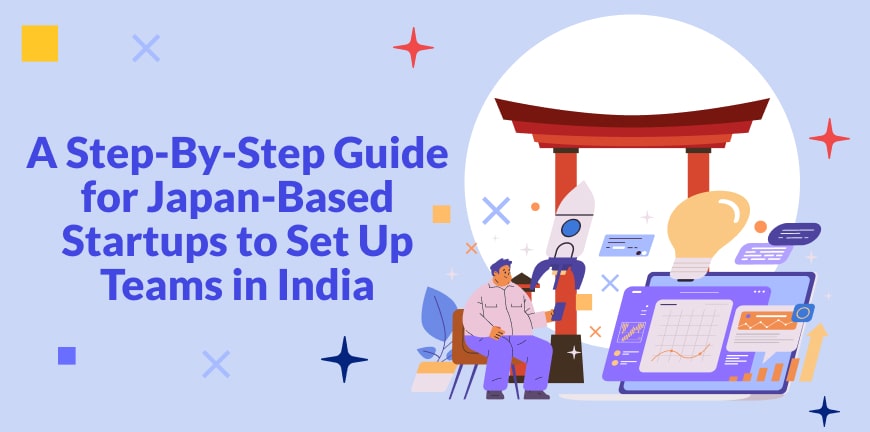
Leading Through Change: Crisis Management Lessons for Indian CXOs
27/06/2025
Empowering the Future of GCCs: ALP Consulting Shines as Table Partner at India GCC Connect 2025
27/06/2025The Japan-India Corridor ties have turned out to be a game-changing partnership between the two economic giants, enabling mutual growth both economically and extending support during challenging times.
This alliance is a blessing in disguise, especially for Japan-based startups, since they are experiencing a huge workforce shortage in their backyard and need Indian professionals to bridge the talent gap in a huge way.
Creating Indian talent teams to propel the business operations of Japanese startups is a strategic move that supports growth, innovation, and global competitiveness. Let’s discuss how Japan-based startups can set up teams in India to run their business operations more effectively and achieve success.
Why Japan-Based Startups Should Build Teams in India
Here are the reasons why setting up teams in India is an excellent choice for Japanese startups.
1. Japan’s Labour Shortage and Ageing Workforce are Negatively Impacting Growth
Japan is plagued by an intense labour shortage due to diminishing birth rates and a smaller population in the working age group. The only option left is to recruit foreign professionals on a large scale to fill the talent gaps and drive growth.
Out of all nations, India seems to be the best bet due to cultural similarities, a large talent pool availability in both IT and non-IT sectors, ready to work for a relatively lesser salary package, etc.
These advantages are especially ideal for Japanese startups that have investment constraints. Building Indian teams helps Japanese companies maintain productivity, seamless communication, scale operations, and ensure long-term business continuity.
2. Access to a Widely Spread Skilled Talent Pool
India is home highly educated workforce with a passion for career success and graduates with expertise in IT, engineering, and business services. These qualities are tailor-made for startups requiring quality output at affordable costs.
3. Cost-Effective Operations & Staffing
When compared to other countries, India has relatively lower operating costs, encompassing salaries, infrastructure, services, and taxes, enabling startups to launch their products and services in a short duration.
4. Time Zone Compatibility for Global Collaboration
India’s time zone is apt for bridging Japan and Western markets, allowing seamless communication and extended productivity cycles. This unique time zone advantage is ideal for global customer support and development.
5. Attraction to Startups and Robust IT Ecosystem
Indian talents are hungry for knowledge and career growth, often attracting them to join a start-up company. The drive for career success, paired with a colossally growing IT ecosystem, creates a dynamic environment for long-term collaboration and building future-ready teams on a global scale.
6. Accommodating Business Environment & Seamless Regulatory Support
India’s foreign investment procedures & policies, labour laws, and company setup regulations are relatively flexible and investor friendly. This encourages Japanese startups to establish and grow their business with relative ease and reduced legal complexities.
Understanding the Indian Talent Landscape
India’s diverse talent pool seems to be the fuel of success for global startups, especially in the IT and fintech sectors. For Japanese startups seeking exponential growth both in terms of profits and as a brand, understanding key aspects of India’s workforce ecosystem is essential for effective workforce setup and long-term success.
1. Diverse Talent Pool Across States
India produces nearly 15 lakh technical graduates annually, especially in engineering, IT, and management. Additionally, most Indian talents have years of experience building software and IT applications with minimal resources. These qualities can help Japanese startups to be productive from Day 1.
2. Competitive Compensation & Cost Efficiency
As the Indian currency value is lower than the Japanese Yen and the cost of living is relatively lower, the startups can hire top talent while optimising operational costs without compromising on quality or expertise.
3. Strong Presence of IT and Tech Hubs
Developed cities like Bengaluru, Pune, Hyderabad, and Chennai, along with numerous tier-2 cities, are home to thriving tech and IT ecosystems. They automatically build a vibrant talent pool of collaborative and innovative networks ideal for Japanese startups looking to establish their business on a large scale.
4. High English and Bilingual Proficiency with Global Outlook
It is a known fact that Indian professionals have good fluency in English and extensive experience working with global teams across different time zones. Additionally, Indians have a knack for learning Japanese quickly, when compared to other overseas professionals, making them ideal for bilingual hiring. This eases collaboration, integration, and client communication for Japanese startups expanding globally.
5. Growing Focus on Innovation & Startups
India’s startup-friendly environment encourages problem-solving, adaptability, and innovation. These qualities align perfectly with the fast-paced demands of Japanese startups building future-ready teams.
6 Steps Taken by Japan-Based Startups to Set Up Teams in India
Japan-based startups can gain access to world-class talent and cost-effective growth if they decide to set up an Indian team to run their business operations and client management. Here are the steps that will guide Japanese startup think tanks to navigate the process of building high-performing teams in India that can secure the company’s future for the long haul.
1. Clearly Define Business Goals and Talent Needs
The Japanese startup’s core management team can begin their team-building journey in India by outlining its business objectives, team structure, skill requirements, and timelines. Setting clear goals will help align recruitment strategies and ensure the finalised Indian team has enough skills and expertise to manage global operations.
2. Understand Legal and Regulatory Requirements from End-to-End
The Japanese startup setup team must familiarise itself with India’s labour laws, applicable taxes and related regulations, visa requirements, and MNC registration norms. Ensuring compliance from day one protects the business from unwarranted legal complications.
3. Choose the Right Hiring Model
Based on the business requirements and available funds, Japanese startups must choose the right-fit model that delivers the best outcomes. The model choices can be direct hiring, a subsidiary setup, a PEO/EOR, or a reputed staffing partner like ALP Consulting.
4. Build an Effective HR & Onboarding Process
Develop culturally aware HR policies and onboarding programs and align with Indian workforce expectations to build engagement, productivity, and long-term employee retention initiatives.
5. Focus on Team Integration and Management
Try to establish regular communication, performance reviews, and cultural training to bridge gaps, promote collaboration, and foster a shared company vision across geographies.
How ALP Consulting Supports Japan-Based Startups in India?
Japanese startups may find it challenging to establish an Indian team within their in-house team or partner with an unfamiliar recruiting entity in India. Additionally, identifying and onboarding Indian talents with bilingual proficiency and a cultural fit requires specialised hiring expertise.
ALP Consulting, a subsidiary of Outsourcing Inc. Japan is a leading HR and recruiting agency specialising in providing bilingual recruitment services for Japanese-based startups and MNCs.
At ALP, we offer two types of talent acquisition support for Japanese startups. Firstly, we will directly recruit professional’s ideal for working in Japanese-based companies, as well as candidates with bilingual proficiency up to the N2 level (Business communication level Japanese fluency).
The second hiring model is through an in-house internship and a Japanese language training program. Here, we will provide a 4–6-month end-to-end career development program which includes language training, internship, cultural exposure, and employment in Japanese-based companies.
Both experienced professionals and final-year graduates will be eligible to enrol in this program. The steps involved in the career development program in Japan include:
- 4-6 months of internship/apprenticeship once candidates complete the N4 level and graduation.
- ALP will train candidates for the N3-level JLPT entrance exam. This ensures that communication level and language proficiency reach the professional stage.
- Once candidates complete the internship program and clear the N3 level exam, ALP will set up interviews with Japanese startup clients.
- The selected candidates will be further trained in N2-level communication, client-specific skills, and Japanese work culture.
- Based on Japanese client requirements and the offer terms, candidates will either be asked to work in an Indian setup or will be sent to Japan to start their career overseas. ALP will provide complete visa support and onboard assistance to smooth the transition.
Frequently Asked Questions (FAQs)
1. Why should Japanese startups consider building teams in India?
India offers a skilled, cost-effective workforce, a strong IT ecosystem, and favourable regulations to support startup growth and scalability.
2. What hiring models are suitable for Japan-based startups entering India?
Japanese-based startups can opt for direct hiring, set up subsidiaries, or use PEO/EOR or staffing partners like ALP Consulting.
3. How does ALP Consulting help with bilingual hiring for Japanese startups?
ALP recruits bilingual professionals directly or through an internship-plus-language training program for startup-specific hiring needs.
4. What does the ALP internship and training program include?
It includes Japanese language training, cultural orientation, internships, JLPT certification, and job placement with Japanese startup clients.
5. Can ALP help startups with the relocation of Indian professionals to Japan?
Yes, ALP provides visa processing, N2-level training, and onboarding support for relocating Indian talent to Japan for employment.
Contact Us For Business Enquiry

Kasthuri R
Kasthuri R is the Co-Founder & Executive Director at ALP Consulting, bringing over 23 years of experience in search, staffing, and HR consulting. She has been instrumental in driving ALP’s recruitment, employee leasing, and executive search practices across diverse industry verticals. With deep expertise in talent acquisition, HR strategy, and operational management, Kasthuri has built scalable, client-focused solutions that enhance workforce efficiency. Her strategic leadership continues to steer ALP Consulting toward innovation and excellence in people management.




